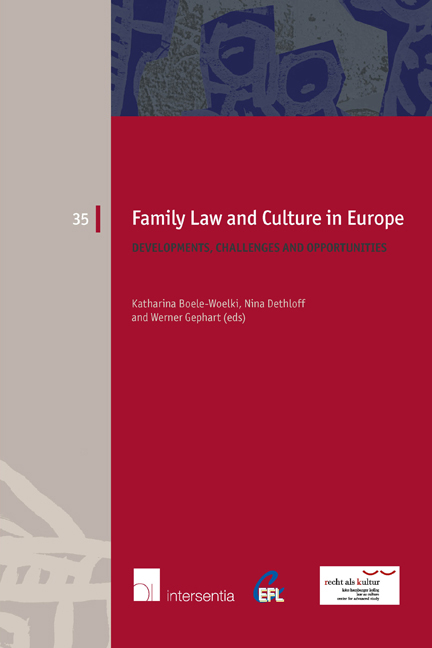Book contents
- Frontmatter
- Preface
- Contents
- List of Authors
- PART ONE THE CEFL PRINCIPLES ON PROPERTY RELATIONS BETWEEN SPOUSES
- PART TWO BREAKUP OF (NON-)FORMALISED RELATIONSHIPS
- PART THREE NEW CONCEPTS OF PARENTAGE
- PART FOUR INTERNATIONAL FAMILY RELATIONSHIPS
- PART FIVE TRANSNATIONAL FAMILIES: ACROSS NATIONS AND CULTURES
- Family Life and EU Citizenship: The Discovery of the Substance of the EU Citizen's Rights and its Genuine Enjoyment
- Private and Family Life versus Morals and Tradition in the Case Law of the ECtHR
- Real-Life International Family Law: Belgian Empirical Research on Cross-Border Family Law
- Transnational Family Relations Involving Moroccan Nationals Living Abroad: An Analysis of the Implementation of the Moroccan Family Code Brief report on research in progress
- Family Law as Culture
- EUROPEAN FAMILY LAW SERIES
Family Life and EU Citizenship: The Discovery of the Substance of the EU Citizen's Rights and its Genuine Enjoyment
from PART FIVE - TRANSNATIONAL FAMILIES: ACROSS NATIONS AND CULTURES
Published online by Cambridge University Press: 22 November 2017
- Frontmatter
- Preface
- Contents
- List of Authors
- PART ONE THE CEFL PRINCIPLES ON PROPERTY RELATIONS BETWEEN SPOUSES
- PART TWO BREAKUP OF (NON-)FORMALISED RELATIONSHIPS
- PART THREE NEW CONCEPTS OF PARENTAGE
- PART FOUR INTERNATIONAL FAMILY RELATIONSHIPS
- PART FIVE TRANSNATIONAL FAMILIES: ACROSS NATIONS AND CULTURES
- Family Life and EU Citizenship: The Discovery of the Substance of the EU Citizen's Rights and its Genuine Enjoyment
- Private and Family Life versus Morals and Tradition in the Case Law of the ECtHR
- Real-Life International Family Law: Belgian Empirical Research on Cross-Border Family Law
- Transnational Family Relations Involving Moroccan Nationals Living Abroad: An Analysis of the Implementation of the Moroccan Family Code Brief report on research in progress
- Family Law as Culture
- EUROPEAN FAMILY LAW SERIES
Summary
First and foremost, families in the European Union have to look to the national bodies of law regulating their legal relationships. On the EU level, the conflicts of laws as well as jurisdiction and the recognition and enforcement of judgments in family matters have been dealt with, but there is virtually no EU substantive family law. The same is true for the regulation of immigration. Article 79 TFEU allows for limited legislative action in accordance with the underlying principles of subsidiarity and proportionality in the areas of law enumerated in Article 79(2) TFEU. In spite of that commitment, the development of a common EU immigration policy is still a dream for the future. Family reunification policy has not been agreed upon within the European Union. However, on the basis of European Union citizenship, a remarkable body of case law regarding the family life of EU citizens with third country nationals has emerged. Hence, EU law increasingly influences family life in the European Union.
EU CITIZENSHIP AS A TRIGGER FOR FUNDAMENTAL EVOLUTIONS
EU citizenship is intrinsically related to the EU's integration process and has brought about significant evolutions.
MOVING BEYOND THE MARKET RATIONALE
Moving beyond the market rationale, EU citizenship was introduced by the Treaty of Maastricht, thus at a time when the European Economic Community transformed into the European Union. The original Treaty of Rome presupposed not only Member State nationality, but also economic activity in order to enjoy the fundamental freedoms. However, these economically active ‘market citizens’ only represent a portion of EU citizens.
EU citizenship shows that the European Union's aspirations go beyond the traditional economic rationale. Free movement is no longer for economically active persons only. Instead, EU citizenship is designed to be the fundamental status of the nationals of all Member States, as the Court of Justice of the European Union (CJEU) has repeatedly held and as EU legislative acts confirm. All EU citizens have a right to move and reside freely within the Union and corresponding rights are granted to their family members, irrespective of their nationality, but under certain conditions. These conditions are in particular laid out in the Citizens’ Rights Directive.
- Type
- Chapter
- Information
- Family Law and Culture in EuropeDevelopments, Challenges and Opportunities, pp. 293 - 304Publisher: IntersentiaPrint publication year: 2014

